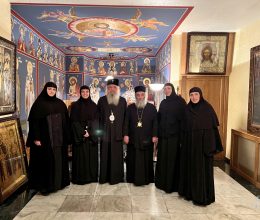On 6th and 7th October 2018 in Kalishta a jubilee Archbishopric Ecclesiastic-National Council was organized, on the occasion of the 60 year anniversary since the Second Ecclesiastic-National Council, which took place on 4th till 6th October 1958 and during which the revival of the Ohrid Archbishopric was proclaimed and the first Archbishop Dositheus was elected.
The Council started its session the morning of 6th October, under the leadership of His Beatitude, the Archbishop of Ohrid and Macedonia, Mr. Stephen, and in its course several insignificant administrative Constitution changes were adopted. This was preceded by the ratification and confirmation of some decisions which have already been approved by the Holy Synod, such as the division of the Australian-New Zeland diocese and the previous diocese of Polog and Kumanovo in two parts etc.
That evening in the catholical church of the Divine Wisdom – St. Sophia in Ohrid, a ceremonious academy was held during which His Beatitude Mr. Mr. Stephen presented his jubilee speech regarding the festive occasion and this was followed by a presentation of some archived video material of the Second Ecclesiastic – National Council in 1958. The Academy concluded with the ecclesiastic chants of the monastic choir of our Holy Bigorski Monastery.
The next morning on 7th October a Synodal Archiereic Liturgy was served, with which the activity of the Council was officially concluded.
It’s worth mentioning that the Ecclesiastic-National Council is a practice which appears for the first time in the XVIII century in the Serbian Orthodox Church, during the Habsburg reign, with the purpose of providing an opportunity for certain foreign factors to influence or limit the right of the Church to make decisions. In SOC this institution has been abolished since 19911, and lately there has been an increased number of supporters of the idea that MOC should also discontinue the mentioned institution, or give it just a ceremonious character, since according to the ecclesiastic regulations, the highest decisive body in the MOC is the Archiereic Council (the Synod). According to the present regulations, the highest decisive body in the MOC is the Ecclesiastic – National Council with the authority to confirm i.e. revise the Synod decisions and to make resolutions and conclusions. This is absurd, having in mind that among the participants there are lay people with a vote equal to the one of the Bishops and are more numerous than them so that, unfortunately, politically motivated decisions under the influence of public opinion, regarding issues which are not in the jurisdiction of the Church, but rather of the respective government institutions, are frequently made. Such was the case with this Council.















